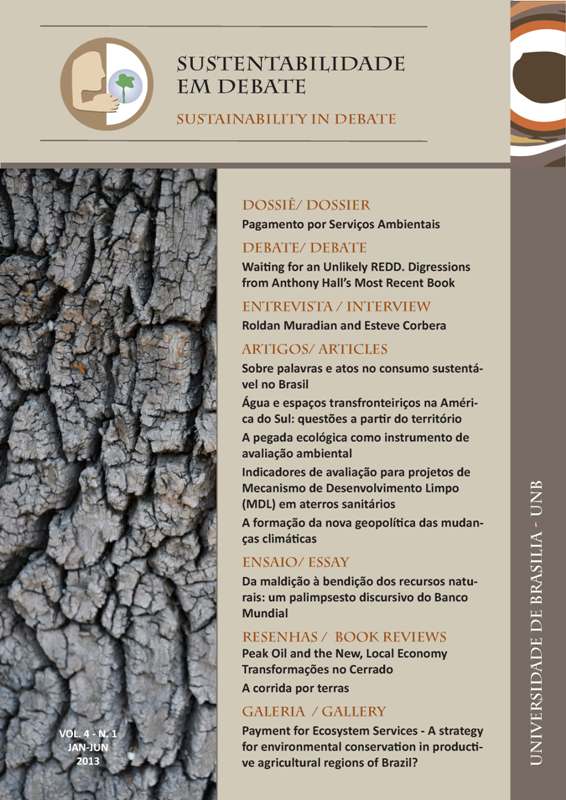Da maldição à bendição dos recursos naturais:
um palimpsesto discursivo do Banco Mundial
DOI :
https://doi.org/10.18472/SustDeb.v4n1.2013.9212Mots-clés :
Práticas ambientais, Banco Mundial, Resenha críticaRésumé
A publicação “Recursos Naturais na América Latina: indo além das altas e baixas”, de J. Nash, E. Sinnot, e A. De La Torre1 (Rio de Janeiro: Banco Mundial/Editora Elsevier, 2010. 168 p.) apresentada e discutida neste Ensaio tem o objetivo de difundir para um público mais amplo o conteúdo de um relatório do Banco Mundial (BM) - elaborado em conjunto por três de suas unidades: o Escritório do Economista- Chefe para América Latina e Caribe (ALC), o Departamento de Redução e de Gestão da Pobreza e o Departamento de Desenvolvimento Sustentável. O lugar institucional de encomenda e elaboração do estudo (região ALC e respectivas áreas social e ambiental do Banco) explica o seu tom prescritivo e emulativo.2 O ponto principal do texto é que a especialização em commodities, segundo o BM, pode e deve ser vantajosa, inclusiva e sustentável necessariamente nessa ordem ”“ para regiões ou países.
Téléchargements
Références
em http://www.cs.wright.edu/~swang/cs409/Hardin.pdf Acesso em 26 de
junho de 2013.
MALONEY, W; LEDERMAN, D. In Search of the Missing Resource Curse. Policy
Research Working Paper, nº 4,766. Washington: World Bank, 2008.
SACHS, Jeffrey D. and WARNER, Andrew. Natural Resource Abundance and Economic
Growth. National Bureau of Economic Research. Working Paper 5, 398. Cambridge:
Massachusetts, 1995.
__________. The Curse of Natural Resources. European Economic Review 45: 827-
838. Center for International Development, Harvard University. Cambridge,
Massachusetts, 2001.
REIS, Cristina F. de Borja. Desenvolvimento econômico liderado por recursos naturais:
uma revisão teórica e crítica da literatura. Trabalho apresentado no XVII Encontro
Nacional da SEP - Sociedade de Economia Política. Rio de Janeiro, 2012.
Téléchargements
Publié-e
Comment citer
Numéro
Rubrique
Licence
SUSTAINABILITY IN DEBATE – Copyright Statement
The submission of original scientific work(s) by the authors, as the copyright holders of the text(s) sent to the journal, under the terms of Law 9.610/98, implies in the concession of copyrights of printed and/or digital publication to the Sustainability in Debate Journal of the article(s) approved for publication purposes, in a single issue of the journal. Furthermore, approved scientific work(s) will be released without any charge, or any kind of copyright reimbursement, through the journal’s website, for reading, printing and/or downloading of the text file, from the date of acceptance for publication purposes. Therefore, the authors, when submitting the article (s) to the journal, and gratuitous assignment of copyrights related to the submitted scientific work, are fully aware that they will not be remunerated for the publication of the article(s) in the journal.
The Sustainability in Debate Journal is licensed under Creative Commons License – Non-Commercial-No-Derivation Attribution (Derivative Work Ban) 3.0 Brazil, aiming at dissemination of scientific knowledge, as indicated on the journal's website, which allows the text to be shared, and be recognized in regards to its authorship and original publication in this journal.
Authors are allowed to sign additional contracts separately, for non-exclusive distribution of the works published in the Sustainability in Debate Journal (for example, in a book chapter), provided that it is expressed the texts were originally published in this journal. Authors are allowed and encouraged to publish and distribute their text online, following publication in Sustainability in Debate (e.g. in institutional repositories or their personal pages). The authors expressly agree to the terms of this Copyright Statement, which will be applied following the submission and publishing by this journal.









